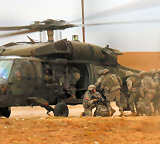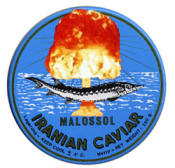 ABOVE: John L. Withers, II
ABOVE: John L. Withers, II
On Friday, a federal grand jury indicted arms dealer AEY and four company officials on charges, among others, that they committed procurement fraud and lied to U.S. officials about the origin of Chinese manufactured ammunition supplied by the company to Afghan forces in Afghanistan pursuant to a U.S. Government contract. Section 126.1 of the International Traffic in Arms Regulations provides that it is the policy of the United States to deny approvals for exports and imports of defense articles originating in China.
Today, Henry Waxman, the Chairman of the House Committee on Oversight and Government Reform, released a letter detailing evidence the Chairman said suggested that John L. Withers, II, the U.S. ambassador to Albania, was involved in efforts to conceal the origin of the Chinese ammunition. The Chinese-made ammunition was being sold to AEY by the Albanian Ministry of Defense through the Military Export Import Company of Albania (MEICO). Because the Ministry, AEY and MEICO knew that Chinese ammunition couldn’t be sold by AEY, the Chinese ammunition was being repackaged at a facility in Albania prior to its export. When a New York Times reporter wanted to inspect the facility, the Albanians became alarmed.
According to testimony before the Oversight and Government Reform Committee by Major Larry Harrison, a Defense Department official working in Albania, the Albanian Defense Minister requested an urgent meeting with the U.S. Ambassador in November 2007:
Major Harrison stated that in response to the Albanian Defense Minister’s request, he contacted the U.S. Embassy’s Deputy Chief of Mission, Stephen Cristina, who arranged for a meeting to take place at his private residence in Tirana that evening. Major Harrison personally attended the meeting, along with the Albanian Defense Minister, Ambassador Withers, Deputy Chief of Mission Cristina, and the Embassy’s Regional Security Officer, Patrick Leonard.
According to Major Harrison, the meeting lasted for several hours, ending around midnight. Major Harrison told the Committee that during this meeting, the Albanian Defense Minister asked for help from the U.S. Ambassador?l According to Major Harrison, “He made several comments to the effect of how he had been a friend of the U.S., he’d help the U.S…. He felt the U.S. owed him something.”
Major Harrison stated that the officials then discussed how to handle the New York Times reporter. He stated that his advice was to not allow the reporter to visit the facility, but that his advice was not accepted. Instead, the Albanian Defense Minister called the commanding general of the Albanian military forces and instructed him to remove all Chinese ammunition boxes from the site of the repackaging operation so that “there would be nothing for the reporter to see.” According to Major Harrison, “the Ambassador agreed that this would alleviate the suspicion of wrongdoing, if Mr. Wood [the New York Times reporter], while he was at Rinas, did not see Chinese ammo boxes.”
Waxman also alleges that U.S. embassy officials also attempted to conceal information about the November 2007 meeting from the Committee. This allegation is based on a document which the Embassy supplied to the Committee on its meetings with Albanian officials with respect to AEY contract and which did not fully describe the meeting at issue.
Neither the State Department, nor Ambassador Withers, has issued a response to these charges, but we won’t be surprised if the State Department makes allusions to a certain novel by Joseph Conrad and a character named Kurtz.
 Back in 1997, the folks at Omega Engineering were very bad. They applied to the Bureau of Industry and Security (“BIS”) for a license to ship laboratory equipment to Pakistan. The license was denied. The appeal of the license denial was denied. They shipped the goods anyway with an intermediate stop in Newport, Germany. BIS was not amused. Omega agreed to a $187,000 fine and an order, entered in November 2003, forbidding it from being involved in any exports to Pakistan for five years.
Back in 1997, the folks at Omega Engineering were very bad. They applied to the Bureau of Industry and Security (“BIS”) for a license to ship laboratory equipment to Pakistan. The license was denied. The appeal of the license denial was denied. They shipped the goods anyway with an intermediate stop in Newport, Germany. BIS was not amused. Omega agreed to a $187,000 fine and an order, entered in November 2003, forbidding it from being involved in any exports to Pakistan for five years.
 Posted by
Posted by  Category:
Category: 

 A Florida man and a California man who ran separate aviation parts businesses have been
A Florida man and a California man who ran separate aviation parts businesses have been 
 Alexander Latifi, who was acquitted last February on criminal export charges, has been busy seeking vindication, including seeking an award of attorneys’ fees under the
Alexander Latifi, who was acquitted last February on criminal export charges, has been busy seeking vindication, including seeking an award of attorneys’ fees under the  Iranian sanctions legislation is back on Congress’s menu and Iranian caviar is not. Today the Senate Finance Committee
Iranian sanctions legislation is back on Congress’s menu and Iranian caviar is not. Today the Senate Finance Committee 

